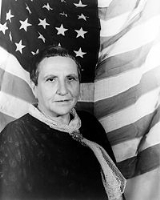
Gertrude Stein, the youngest of a family of five children, was born on February 3, 1874, in Allegheny, Pennsylvania
(merged with Pittsburgh in 1907) to well-educated German Jewish parents, Daniel and Amelia Stein. Her father was a railroad executive whose investments in streetcar lines and real estate made the family wealthy.
When Gertrude was three years old she and her family moved for business, first to Vienna
and then Paris
.
From the very nature of progress, all ages must be transitional. If they were not, the world would be at a stand-still and death would speedily ensue. It is one of the tamest of platitudes but it is always introduced by a flourish of trumpets.![]()
Argument is to me the air I breathe. Given any proposition, I cannot help believing the other side and defending it.![]()
The whole duty of man consists in being reasonable and just... I am reasonable because I know the difference between understanding and not understanding and I am just because I have no opinion about things I don’t understand.![]()
A beauty is not suddenly in a circle. It comes with rapture. A great deal of beauty is rapture. A circle is a necessity. Otherwise you would see no one. We each have our circle.![]()
It is always a mistake to be plain-spoken.![]()
No sense in no sense innocence of what of not and what of delight. In no sense innocence in no sense and what in delight and not, in no sense innocence in no sense no sense what, in no sense and delight, and in no sense and delight and not in no sense and delight and not, no sense in no sense innocence and delight.![]()
Let me recite what history teaches. History teaches.![]()
One does not get better but different and older and that is always a pleasure.![]()
Before the flowers of friendship faded friendship faded.![]()
All of you young people who served in the war. You are a lost generation... You have no respect for anything. You drink yourselves to death.![]()

